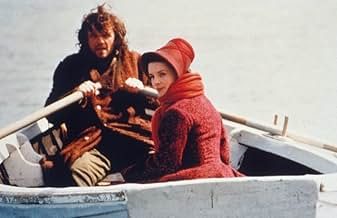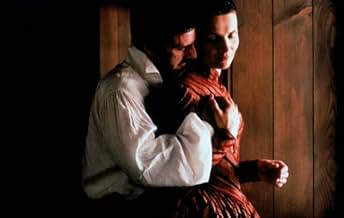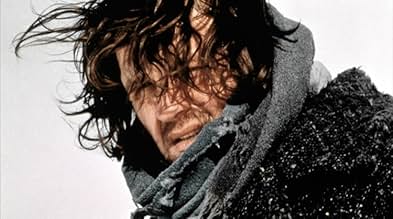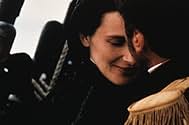La veuve de Saint-Pierre
- 2000
- Tous publics
- 1h 52m
IMDb RATING
7.1/10
5.8K
YOUR RATING
In a small French colony, a drunken man kills someone. While a guillotine is being shipped in, he changes, becoming a good and popular man.In a small French colony, a drunken man kills someone. While a guillotine is being shipped in, he changes, becoming a good and popular man.In a small French colony, a drunken man kills someone. While a guillotine is being shipped in, he changes, becoming a good and popular man.
- Director
- Writers
- Stars
- Awards
- 3 wins & 9 nominations total
- Director
- Writers
- All cast & crew
- Production, box office & more at IMDbPro
Featured reviews
You have to watch the odd foreign film such as this to understand just how far Hollywood has strayed from cinematic honesty. This is a simple, beautifully done, superbly acted piece of theatre set in one of the world's least known places, the fog shrouded French island of St. Pierre, off Newfoundland. It's a simple yet gripping film with an intriguing plot, almost a morality play. There is visceral human drama, much mystery and wonderful soul stirring pathos. And how nice to see a movie without the mandatory Hollywood happy ending. A well spent evening!
Juliette Binoche plays the wife of a military officer in a remote island town in 1849 Newfoundland who becomes devoted to the cause of saving the life of a condemned murderer. I was torn between admiring `The Widow of Saint-Pierre' for not taking the obvious route of having the captain's wife fall in love with her protege and run off with him (e.g., `Mrs. Soffel"), and a feeling of letdown that it was avoiding opportunities for more vivid and realistic drama. That there is an attraction between the two is made clear, especially in the highly charged, yet muted eroticism of the reading lesson scene. This film was based on a true story, but I couldn't help wondering if the actual killer was as saintly and devoid of guile as he seems in this movie. Among other things, he resists his attraction to his benefactress, although she would probably be more than willing to sleep with him, saves the life of a village woman whose house has slipped its moorings, and passes up an excellent chance to escape because he doesn't want to get anybody in trouble. He impregnates another woman, although it appears to be true love, and he then does the decent thing and marries her. One could accept that a criminal could be redeemed, but here he's a little too good to be true, reinforcing my suspicion that the characterization was meant more to reinforce the filmakers' anti-capital punishment stance than as a reflection of his actual personality. Daniel Auteil as her husband is stuck playing a character whose emotions remain largely inscrutable. The film would have us believe that there is no jealousy or resentment in the husband as his wife dedicates her life to rehabilitating and saving the condemned man under his charge. Ultimately, the captain gives up his own life for both of them, but I kept waiting for a significant sign that he had some inner conflict about doing so. After all, he is a career military officer sworn to uphold the law as it is. Who knew that underneath he was a bleeding heart liberal! This film is interesting and absorbing up to a point, but ultimately, it's also bland and overly complacent dramatically.
This was a nice little film--not great, but nice--and on a grading scale, I'd give it a B or a B-.
Two points to add to what's already been said.
First, for those of you thinking of renting this movie (I rented it on DVD), DO NOT WATCH IT WITH THE ENGLISH DUBBING (available via the "Special Features - Audio" section of the DVD).
The dubbing is horrible; voices sound dubbed, rather than seeming to come from the actors themselves. Worse, I guess in order to make the words seem to match more closely with the movements of the actors' lips, the English dialogue is (IMHO) significantly different from the French! I watched the movie with English dubbing first, then in French with English subtitles. There is actually one point in the movie where someone asks, "Why did so-and-so do that?" The answer is completely different depending on whether you are watching the English or French translation.
The movie is best watched in French--hearing the actors' real voices works so much better than hearing the dubbed voices--with English subtitles, if you need the translation.
Second point: I was disappointed that no backstory (with respect to Le Capitain and La Capitaine) was forthcoming. I thought that the unfolding tale hinted at some sort of secret, something in his (and maybe her) past, that would shed more light on their current actions. In short, I felt that the couple's motivations and character were not sufficiently explored. And if this was because the movie wasn't particularly *about* motivations and in-depth character study, then I actually think that I would have preferred more overtly expressive actors. Enigmatic looks (IMO, that's what they were) without explanation don't really work for me.
Having said that, the movie was still a cut above your ordinary film, and worth the viewing.
Two points to add to what's already been said.
First, for those of you thinking of renting this movie (I rented it on DVD), DO NOT WATCH IT WITH THE ENGLISH DUBBING (available via the "Special Features - Audio" section of the DVD).
The dubbing is horrible; voices sound dubbed, rather than seeming to come from the actors themselves. Worse, I guess in order to make the words seem to match more closely with the movements of the actors' lips, the English dialogue is (IMHO) significantly different from the French! I watched the movie with English dubbing first, then in French with English subtitles. There is actually one point in the movie where someone asks, "Why did so-and-so do that?" The answer is completely different depending on whether you are watching the English or French translation.
The movie is best watched in French--hearing the actors' real voices works so much better than hearing the dubbed voices--with English subtitles, if you need the translation.
Second point: I was disappointed that no backstory (with respect to Le Capitain and La Capitaine) was forthcoming. I thought that the unfolding tale hinted at some sort of secret, something in his (and maybe her) past, that would shed more light on their current actions. In short, I felt that the couple's motivations and character were not sufficiently explored. And if this was because the movie wasn't particularly *about* motivations and in-depth character study, then I actually think that I would have preferred more overtly expressive actors. Enigmatic looks (IMO, that's what they were) without explanation don't really work for me.
Having said that, the movie was still a cut above your ordinary film, and worth the viewing.
In 1849, in the Archipelago of Saint-Pierre et Miquelon, the drunken Ariel Neel Auguste (Emir Kusturica) and his partner Louis Ollivier (Reynald Bouchard) kill for a futile motive (to see if he is fat or just big) the fishing boat captain Coupard (Michel Daigle). Nell, who stabbed the victim, is sentenced to die with his head severed in the guillotine while Louis is sentenced to hard labor. During the transportation to the prison under the custody of Captain Jean (Daniel Auteuil), there is an accident and Louis dies. While spending his days in the cell waiting for the guillotine and the executioner, Neel is invited by the captain's wife Mrs. Pauline (Juliette Binoche) to help her in her garden and becomes her protégé. Later he has a process of rehabilitation helping the locals in minor works and becomes very popular in the island. When he saves the building Café du Nord and her owner from sinking in the sea, his popularity increases and nobody but the governor and politicians of the council wants his death. Neel marries Eleontine Jeanne-Marie, but sooner he is informed that the ship Marie Galante has just left Martinique bringing a guillotine. Now the Governor and politicians need to find an executioner in the population to execute the sentence.
"La Veuve de Saint-Pierre" is a beautiful dramatization of a story of rehabilitation and intolerance. I do not know whether this event is partially true or not – there are references in Internet to this story but in sites that I can not trust – but this movie is wonderful. The story and screenplay are engaging and very well written with powerful lines; the direction of Patrice Leconte and the performances are top- notch, with Juliette Binoche extremely beautiful and elegant as usual and showing a magnificent chemistry with Daniel Auteuil; the cinematography and costumes are wonderful. Based on my adjectives, it is unnecessary to say that I loved this movie. My vote is eight.
Title (Brazil): "A Viúva de Saint-Pierre" ("The Widow of Saint-Pierre")
"La Veuve de Saint-Pierre" is a beautiful dramatization of a story of rehabilitation and intolerance. I do not know whether this event is partially true or not – there are references in Internet to this story but in sites that I can not trust – but this movie is wonderful. The story and screenplay are engaging and very well written with powerful lines; the direction of Patrice Leconte and the performances are top- notch, with Juliette Binoche extremely beautiful and elegant as usual and showing a magnificent chemistry with Daniel Auteuil; the cinematography and costumes are wonderful. Based on my adjectives, it is unnecessary to say that I loved this movie. My vote is eight.
Title (Brazil): "A Viúva de Saint-Pierre" ("The Widow of Saint-Pierre")
I have always been a Patrice Leconte devotee. His career in which incoherence and eclecticism get on well together (perhaps that's why he's often slated by French critics) is one of the most fruitful you could dream of, even if French mainstream public often associates his name with "les Bronzés" (1978), a commercial hit which put him on the map as well as the actors, the famous troupe of the Splendid and tends to overshadow the rest of his prolific career which spawned treasures like "Tandem" (1987), "Monsieur Hire" (1989) or "Le Mari De la Coiffeuse" (1990).
This vehicle "La Veuve De Saint Pierre" (2000) was originally to be directed by another veteran of French cinema Alain Corneau (who sadly shot the insipid "Prince Du Pacifique" that year, perhaps the nadir of his career) but he turned down the role due to disputes with the producers. So, Patrice Leconte inherited the project. His choice was motivated by the desire to work with one of the two main roles, Juliette Binoche (he had teamed up with Daniel Auteuil the previous year for "La Fille Sur Le Pont, 1999)
The title of the film has a double meaning: the "veuve" refers to Binoche after her husband's demise. The opening sequence presents her to us in her mourning garb (Leconte's work is served by lavish costumes). The audience knows that she is the "veuve" and will discover in the long flashback, how she has lost her husband. But a "veuve" is also a slang word for the sinister guillotine and it has a tongue-in-cheek connotation: Saint Pierre unlike France hasn't got a death instrument and must have one. All the time, the island is deprived of a guillotine, it remains a "veuve".
There are clearly two sides. On the one hand, the officers' who govern the island and are die-hards of the death sentence and on the other hand, the private triangle which encompasses Auteuil, Binoche and Kusturica. Between the two poles, the impending threat of the execution with the recurring images of the ship sailing across the Atlantic with on board the guillotine. The scenario eschews the tempting trap of the Manicheism and the officers aren't caricatures. As a matter of fact, one of the main thrusts of the film is to deride the leaders of the island who seek at all costs to keep the death sentence and their obstinacy is made ludicrous by the postpone of the sentence and the last words of the voice over contain grim details which give a slap to one of Doctor Guillotin's famous words: "a painless death is a progress for humanity". Moreover, they prove to be unscrupulous because when a new inhabitant settles on the island, they entrust him the role of the executioner without taking care of his opinion.
In the private triangle, madame La by guiding Neel on the way of redemption is full of condescension and solicitude but she's a complex character. Her reasons and motivations to redeem Neel are rather elusive even if she says (I don't remember the accurate cue): "I think human soul is unpredictable and can be able to become conscientious and intelligent. A little gratifying cue which should have been more construed and fleshed out and remains an inkling. Then, why would she encourage the sacrifice of such a devoted husband to try to save a convicted killer whereas it's doomed to failure? Is it a response to her husband's love? (If Auteuil sacrifices himself it's for love for his wife and respect for Neel). Certainly and if so, Leconte's piece of work is a novel and quirky approach on the relationship between husband and wife, a quite notable feat for an author who has seldom studied this topic in his filmography, except maybe in "Le Mari De La Coiffeuse".
Buoyed by a more than palatable cast with a special mention to Emir Kusturica who was a discerning choice because he could convey vulnerability and fragility to his persona of great strapping man, "La Veuve De Saint Pierre" may be derivative if we consider the theme of redemption and the thrust quoted in the fourth paragraph but its treatment is a far cry from Hollywood's formulaic conventions. How to rank it in Leconte's uneven but usually riveting filmography? It isn't on a par with his towering achievements but stands out as a more than palatable flick which however could have gained by being more deepened.
This vehicle "La Veuve De Saint Pierre" (2000) was originally to be directed by another veteran of French cinema Alain Corneau (who sadly shot the insipid "Prince Du Pacifique" that year, perhaps the nadir of his career) but he turned down the role due to disputes with the producers. So, Patrice Leconte inherited the project. His choice was motivated by the desire to work with one of the two main roles, Juliette Binoche (he had teamed up with Daniel Auteuil the previous year for "La Fille Sur Le Pont, 1999)
The title of the film has a double meaning: the "veuve" refers to Binoche after her husband's demise. The opening sequence presents her to us in her mourning garb (Leconte's work is served by lavish costumes). The audience knows that she is the "veuve" and will discover in the long flashback, how she has lost her husband. But a "veuve" is also a slang word for the sinister guillotine and it has a tongue-in-cheek connotation: Saint Pierre unlike France hasn't got a death instrument and must have one. All the time, the island is deprived of a guillotine, it remains a "veuve".
There are clearly two sides. On the one hand, the officers' who govern the island and are die-hards of the death sentence and on the other hand, the private triangle which encompasses Auteuil, Binoche and Kusturica. Between the two poles, the impending threat of the execution with the recurring images of the ship sailing across the Atlantic with on board the guillotine. The scenario eschews the tempting trap of the Manicheism and the officers aren't caricatures. As a matter of fact, one of the main thrusts of the film is to deride the leaders of the island who seek at all costs to keep the death sentence and their obstinacy is made ludicrous by the postpone of the sentence and the last words of the voice over contain grim details which give a slap to one of Doctor Guillotin's famous words: "a painless death is a progress for humanity". Moreover, they prove to be unscrupulous because when a new inhabitant settles on the island, they entrust him the role of the executioner without taking care of his opinion.
In the private triangle, madame La by guiding Neel on the way of redemption is full of condescension and solicitude but she's a complex character. Her reasons and motivations to redeem Neel are rather elusive even if she says (I don't remember the accurate cue): "I think human soul is unpredictable and can be able to become conscientious and intelligent. A little gratifying cue which should have been more construed and fleshed out and remains an inkling. Then, why would she encourage the sacrifice of such a devoted husband to try to save a convicted killer whereas it's doomed to failure? Is it a response to her husband's love? (If Auteuil sacrifices himself it's for love for his wife and respect for Neel). Certainly and if so, Leconte's piece of work is a novel and quirky approach on the relationship between husband and wife, a quite notable feat for an author who has seldom studied this topic in his filmography, except maybe in "Le Mari De La Coiffeuse".
Buoyed by a more than palatable cast with a special mention to Emir Kusturica who was a discerning choice because he could convey vulnerability and fragility to his persona of great strapping man, "La Veuve De Saint Pierre" may be derivative if we consider the theme of redemption and the thrust quoted in the fourth paragraph but its treatment is a far cry from Hollywood's formulaic conventions. How to rank it in Leconte's uneven but usually riveting filmography? It isn't on a par with his towering achievements but stands out as a more than palatable flick which however could have gained by being more deepened.
Did you know
- TriviaThe film was to be completely filmed on the island of Saint-Pierre, but when the snow failed to arrive, the production had to move further north to Newfoundland for certain sequences.
- GoofsWhen Neel is told he's strong enough to "ramer jusqu'au chez les Anglais", the English subtitles say "row over to Canada" rather than "row over to the English". This introduces an error: both the geography and the dialogue in other scenes make it clear that Newfoundland is meant, but Newfoundland wasn't part of Canada until 1949.
- ConnectionsFeatured in The 58th Annual Golden Globe Awards 2001 (2001)
- How long is Widow of St. Pierre?Powered by Alexa
Details
- Release date
- Countries of origin
- Official site
- Language
- Also known as
- Widow of St. Pierre
- Filming locations
- Fortress of Louisbourg, Louisbourg, Nova Scotia, Canada(as Saint-Pierre)
- Production companies
- See more company credits at IMDbPro
Box office
- Budget
- FRF 100,000,000 (estimated)
- Gross US & Canada
- $3,193,889
- Opening weekend US & Canada
- $31,702
- Mar 4, 2001
- Gross worldwide
- $7,193,889
- Runtime1 hour 52 minutes
- Color
- Sound mix
- Aspect ratio
- 2.35 : 1
Contribute to this page
Suggest an edit or add missing content

Top Gap
By what name was La veuve de Saint-Pierre (2000) officially released in India in English?
Answer































